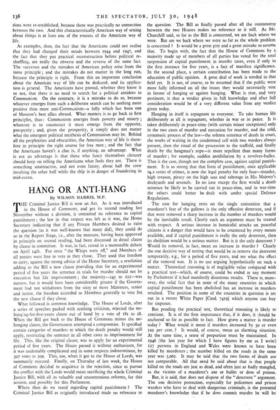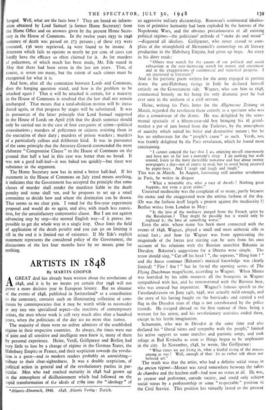HANG OR ANTI-HANG
By WILSON HARRIS, M.P.
THE Criminal Justice Bill is now an Act. As it was introduced in the House of Commons, and got its second reading last November without a division, it contained no reference to capital punishment ; the law in that respect was left as it was, the Home Secretary indicating that if any Private Members desired to raise the question (as it was well-known that many did), they could do so in the Report Stage, i.e., after the measure, having been approved in principle on second reading, had been discussed in detail clause by clause in committee. It was, in fact, raised in a memorable debate on April 14th. For once " the Whips were off," and Members of all parties were free to vote as they chose. They used that freedom to carry, against the strong advice of the Home Secretary, a resolution adding to the Bill a new clause providing that for an experimental period of five years the sentence in trials for murder should not be execution but life imprisonment ; the majority-245 to 222—was narrow, but it would have been considerably greater if the Govern- ment had not withdrawn from the sixty or more Ministers, senior and junior, the freedom accorded to Members generally to vote for the new clause if they chose.
What followed is common knowledge. The House of Lords, after a series of speeches packed with scathing criticism, rejected the no- hang:ng-for-five-years clause out of hand by a vote of 181 to 28. When the Bill got back to the House of Commons minus the no- hanging clause, the Government attempted a compromise. It specified certain categories of murders to which the death penalty would still apply, restricting the sentence in all other cases to imprisonment for life. This, like the original clause, was to apply for an experimental period of five years. The House passed it without enthusiasm, for it was undeniably complicated and in some respects indeterminate, by 307 votes to 209. This, too, when it got to the House of Lords, was summarily rejected. Finally, on Thursday of last week, the House of Commons decided to acquiesce in the rejection, since to pursue the conflict with the Lords would mean sacrificing the whole Criminal Justice Bill, with all its valuable and uncontentious reforms, for this session, and possibly for this Parliament.
Where then do we stand regarding capital punishment ? The Criminal Justice Bill as originally introduced made no reference to the question. The. Bill as finally passed after all the controversy between the two Houses makes no reference to it still. As Mr. Churchill said, so far as the Bill is concerned, we are back where we were. But are we back where we were so far as the whole problem is concerned ? It would be a great pity and a great mistake to assume that. To begin with, the fact that the House of Commons by a majority made up of members of all parties has voted for the total suspension of capital punishment in murder cases, even if only in the first instance for five years, is a fact of manifest significance. In the second place, a certain contribution has been made to the education of public opinion. A great deal of work is needed in that field yet. It is not, of course, to be assumed that if the public were more fully informed on all the issues they would necessarily vote in favour of hanging or against hanging. What is true, and very pertinent, is that a verdict given in full knowledge and after full consideration would be of a very different value from any verdict given today.
Hanging in itself is repugnant to everyone. To take human life deliberately at all is repugnant; whether in war or in peace. It is taken deliberately in peace-time (with certain minor exceptions) only in the two cases of murder and execution for murder, and the cold, systematic process of the law—the solemn sentence of death in court, the weeks of waiting in the condemned cell with two warders always present, then the ritual of the procession to the scaffold, and finally death by the hangman's rope—is mote repellent than many forms of murder ; for example, sudden annihilation by a revolver-bullet. That is the case, though not the complete case, against capital punish- ment. It is so strong that that form of punishment, once applicable to a series of crimes, is now the legal penalty for only four—murder, high treason, piracy on the high seas and sabotage in His Majesty's dockyards and arsenals. In no case except the first would a death sentence be likely to be carried out in peace-time, and in war-time the others could better be dealt with under special Defence Regulations.
. The case for hanging rests on the single contention that a murderer's fear of the gallows is the only effective deterrent, and if that were removed a sharp increase in the number of murders would be the inevitable result. Clearly such an argument must be treated with respect. A serious increase in homicidal attacks on peaceful citizens is a danger that would have to be countered by every means available, and if capital punishment is really the only deterrent, then its abolition would be a serious matter. But is it the only deterrent ? Would its removal, in fact, mean an increase in murder ? Clearly the one decisive way of testing that would be to remove the deterrent temporarily, e.g., for a period of five years, and see what the effect of the removal was. It is no use arguing hypothetically on such a matter. Theoretical reasoning is of negligible value compared with a practical test—which, of course, could be ended at any moment by Parliament if it had manifestly disastrous results. There is, more- over, the solid fact that in none of the many countries in which capital punishment has been abolished has an increase in murders resulted. The position in some of the countries in question is set out in a recent White Paper [Cmd. 74191 which anyone can buy for sixpence.
But pending the practical test, theoretical reasoning is likely to continue. It is of the first importance that, if it does, it should be anchored so far as possible to fact. How grave a matter is murder today ? What would it mean if murders increased by so or even too per cent. ? It would, of course, mean an alarming situation. At the same time, a sense of proportion must be maintained. In 1946 (the last year for which I have figures by me as I write) 127 persons in England and Wales were known to have been killed-by murderers ; the number killed on the roads in the same year was 5,062. It may be said that the two forms of 'death are not comparable. All that need be said about that is that people killed on the roads are just as dead, and often just as badly mangled, as the victims of a murderer's axe or bullet or dose of poison.
But, it is said, that does not dispose of the " deterrent " argument. The one decisive protection, especially for policemen and prison warders who have to deal with dangerous criminals, is the potential murderer's knowledge that if he does commit murder he will be
hanged. Well, what are- the facts here ? They are based on inform- ation obtained by Lord Samuel (a former Home Secretary) from the Home Office and on answers given by the present Home Secre- tary in the House of Commons. In the twelve years 1935 to 1946 sentence of death was passed on 273 persons ; of these 113 were executed, 136 were reprieved, 24 were found to be insane. A deterrent which fails to operate in nearly 6o per cent. of cases can hardly have the efficacy so often claimed for it. As for murders of policemen, of which much has been made, Mr. Ede stated in May that there had been seven in the last ten years. That, of course, is seven too many, but the extent of such crimes must be recognised for what it is.
And how, after all the contention between Lords and Commons, does the hanging question stand, and how is the problem to be attacked again ? That it will be attacked is certain, for a majority in the House of Commons is resolved that the law shall not remain unchanged. That means that a total-abolition motion will be intro- duced again, or that progress by stages will be substituted. It was in pursuance of the latter principle that Lord Samuel suggested in the House of Lords on April 27th that the death sentence should only be carried out in the case of four categories of crime—political assassinations ; murders of policemen or citizens assisting them in the execution of their duty ; murders of prison warders ; murders of a particularly callous and deliberate kind. It was in pursuance of the same principle that the Attorney-General commended the more elaborate " Compromise Clause" to the 'House of Commons on the ground that half a loaf in this case was better than no bread. It was not a good half-loaf—it was baked too quickly—but there was substance in the argument.
The Home Secretary now has in mind a better half-loaf. If his statement in the House of Commons on July 22nd means anything, it indicates that the Government has accepted the principle that some classes of murder shall render the murderer liable to the death penalty and some shall got, and he proposes to set up a small committee to decide how and where the distinction can be drawn. That seems to me clear gain. I voted for the five-year experiment proposal and would do so again, and also, with much less convic- tion, for the unsatisfactory compromise clause. But I am not against advancing step by step—the normal English way—if it proves im- possible to get the whole way in a single leap. Once limit the field of application of the death penalty and you can go on limiting it till in the end it is limited out of existence. If Mr -Ede's explicit statement represents the considered policy of the Government, the discussions of the last four months have by no means gone for nothing.



































 Previous page
Previous page